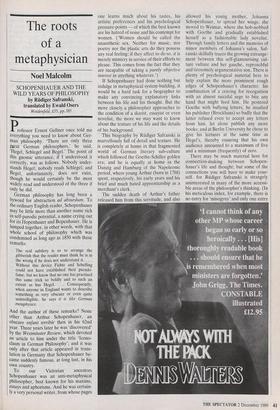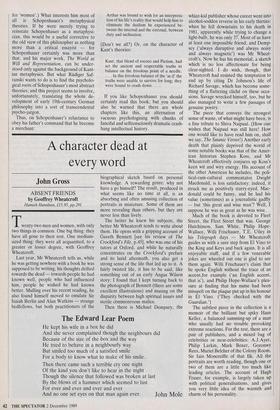The roots of a metaphysician
Noel Malcolm
SCHOPENHAUER AND THE WILD YEARS OF PHILOSOPHY by Rtidiger Safranski, translated by Ewald Osers
Weidenfeld, £35, pp.385
Professor Ernest Gellner once told me everything you need to know about Ger- man philosophy. 'There are only three g‘eat German philosophers,' he said, `Hegel, Schlegel and Begel.' The point of this gnomic utterance, if I understood it correctly, was as follows. Nobody under- stands Hegel; nobody reads Schlep]; and Begel, unfortunately, does not exist, though he would certainly be the most widely read and understood of the three if only he did.
German philosophy has long been a byword for abstraction ad absurdum. To the ordinary English reader, Schopenhauer may be little more than another name rich in self-parodic potential, a name crying out for its Hopenhauer and Bopenhauer. He is lumped together, in other words, with that Whole school of philosophy which was condemned as long ago as 1850 with these remarks: The real subtlety is so to arrange the gibberish that the reader must think he is in the wrong if he does not understand it. . . Without this device Fichte and Schclling could not have established their pseudo- fame; but we know that no one has practised this same trick so boldly and to such an extent as has Hegel. . . . Consequently, when anyone in England wants to describe something as very obscure or even quite unintelligible, he says it is like German metaphysics.
And the author of these remarks? None other than Arthur Schopenhauer, an obscure enfant terrible then in his 62nd year. Three years later he was 'discovered' by the Westminster Review, which devoted an article to him under the title 'Icono- clasm in German Philosophy'; and it was only after that article appeared in trans- lation in Germany that Schopenhauer be- came suddenly famous, at long last, in his own country.
To our Victorian ancestors Schopenhauer was an anti-metaphysical philosopher, best known for his maxims, essays and aphorisms. And he was certain- ly a very personal writer, from whose pages
one learns much about his tastes, his artistic preferences and his psychological pressure-points — of which the best known are his hatred of noise and his contempt for women. (Women should be called the unaesthetic sex. Neither for music, nor poetry nor the plastic arts do they possess any real feeling; if they affect to do so, it is merely mimicry in service of their efforts to please. This comes from the fact that they are incapable of taking a purely objective interest in anything whatever.')
If Schopenhauer had done nothing but indulge in metaphysical system-building, it would be a hard task for a biographer to make any convincing explanatory links between his life and his thought. But the more closely a philosopher approaches to the condition of a diarist, essayist or even novelist, the more we may want to know about the texture of his life and the details of his background.
This biography by Riidiger Safranski is marvellously full of detail and texture. He is completely at home in that fragmented world of German literary sub-culture which followed the Goethe-Schiller golden era; and he is equally at home in the Danzig and Hamburg of the Napoleonic period, where young Arthur (born in 1788) spent, respectively, his early years and his brief and much hated apprenticeship as a merchant's clerk.
The sudden death of Arthur's father released him from this servitude, and also
allowed his young mother, Johanna Schopenhauer, to spread her wings: she moved to Weimar, where she hob-nobbed with Goethe and gradually established herself as a fashionable lady novelist. Through family letters and the memoirs of minor members of Johanna's salon, Saf- ranski skilfully traces the growing estrange- ment between this self-glamourising cul- ture vulture and her gauche, reproachful and tiresomely argumentative son. There is plenty of psychological material here to help explain the more prominent rough edges of Schopenhauer's character: his combination of a craving for recognition with an almost suicidal urge to bite any hand that might feed him. He pestered Goethe with bullying letters; he insulted his publisher (Brockhaus) so badly that the latter refused even to accept any letters from him, let alone publish any more books; and at Berlin University he chose to give his lectures at the same time as Hegel's, thereby ensuring that his own audience amounted to a maximum of five and a minimum (frequently) of zero.
There may be much material here for connection-making between Schopen- hauer's life and thought; but some of the connections you will have to make your- self. for Riidiger Safranski is strangely uninterested in many of the more accessi- ble areas of the philosopher's thinking. (In his meticulous index, for example, there is no entry for 'misogyny' and only one entry
for 'women%) What interests him most of all is Schopenhauer's metaphysical theories. If he were merely trying to reinstate Schopenhauer as a metaphysi- cian, this would be a useful corrective to the old view of this philosopher as nothing more than a critical essayist — for Schopenhauer certainly was more than that, and his major work, The World as Will and Representation, can be under- stood only against the background of Kant- ian metaphysics. But what Riidiger Saf- ranski wants to do is to find the psycholo- gical roots of Schopenhauer's most abstract theories; and this project seems to involve, unfortunately, translating the whole de- velopment of early 19th-century German philosophy into a sort of transcendental psycho-jargon.
Thus, on Schopenhauer's reluctance to obey his father's command that he become a merchant:
Arthur was bound to wish for an interpreta- tion of his life's reality that would help him to eliminate the dualism he experienced be- tween the internal and the external, between duty and inclination.
(Don't we all?) Or, on the character of Kant's theories:
Kant, that blend of rococo and Pietism, had set the ancient and respectable truths to balance on the frivolous point of a needle. . . In this frivolous balance of the 'as if' the truths were unable to survive for long; they were bound to crash down. . . .
If you like Schopenhauer you should certainly read this book; but you should also be warned that there are whole chapters like this, an alternation of vacuous psychologising with chunks of fanciful and selfconsciously dramatic crash- bang intellectual history.











































































 Previous page
Previous page